“They’re all the same.”
I heard that exact same phrase from several different people after a screening of Jurassic World: Fallen Kingdom this weekend.
Did they like it? Sure, with a shrug.
Was it just like the last one? Yeah, aren’t they all?
Will they see the next one? Eh, probably.
Universal’s Jurassic Park movie franchise has cornered the market on one of the purest distillations of cinema’s thrilling potential: a nonstop suspense ride that showcases mythological creatures everybody loves doing jaw-dropping things that terrify us.
And let’s be honest: no one goes to see a Jurassic Park movie for the plot.
We keep going to see the dinosaurs… and we keep going… and going…
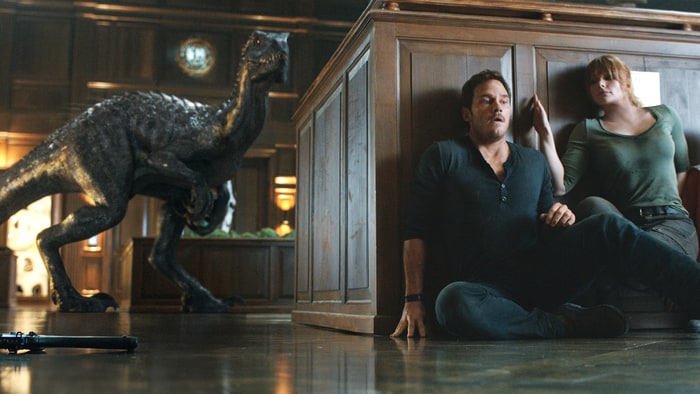
“Hello, I’m the whole point.”
But that doesn’t mean a well-told story wouldn’t make these movies better.
See, there’s a reason the 1993 original Jurassic Park movie is still adored by fans and critics alike, even though special effects have greatly evolved over the past 25 years.
Yes, some of that love is due to nostalgia. And some of it is due to the childlike wonder of seeing “real” dinosaurs onscreen for the first time, a rare thrill that may be technologically improved over time but whose initial, indescribable magic can never truly be repeated.
But there’s also a functional reason why Jurassic Park remains the beloved outlier in a five-film franchise with diminishing critical returns:
Jurassic Park tells a damn good story.
Its sequels? Not so much.
So, why is it so hard to tell a good Jurassic Park story?
Well, Patrick (H) Willems explains the biggest reasons in this very thorough video essay.
But he focuses on the thematic reasons why Jurassic Park was a cinematic unicorn that’s so hard to duplicate, while I want to talk about something more basic:
Story structure.
Jurassic World: Fallen Kingdom has four basic storytelling problems that do the movie a disservice. Some of the most visually impressive action sequences ever filmed are disappointingly squandered in this shrug-worthy plot that’s being driven by characters we barely care about.
And all of it could have been avoided with literally one more script revision, without changing barely any of the film’s actual plot.
Here’s what went wrong story-wise in Jurassic World: Fallen Kingdom, and how it all could have been fixed.
WARNING: SPOILERS AHEAD for a 25 year-old movie plus a new one that you’re really not seeing for the plot anyway, which is the whole problem.
The Cardinal Sin of Exposition
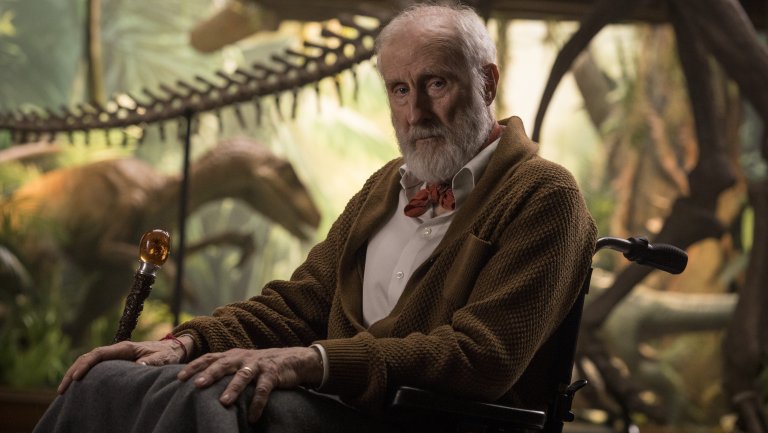
“Hello, I’m a plot device.”
Show, don’t tell.
That’s the first lesson every screenwriter learns, but it seems like one that screenwriter Colin Trevorrow forgot this time around.
In the first act of the film, we learn a lot of plot-relevant information, like:
- The island the dinosaurs live on is about to be destroyed by a suddenly-active volcano
- U.S. Congress is having hearings to decide if they should save the dinos or let them die
- Former Jurassic World manager Claire (Bryce Dallas Howard) now runs a dinosaur nonprofit
- Dino-vet Zoe (Daniella Pineda) and tech geek Franklin (Justice Smith) are Claire’s star volunteers
- Eli (Rafe Spall) works for Lockwood (James Cromwell), a rich man who wants to save the dinos
- Lockwood has a mysterious granddaughter named Maisie (Isabella Sermon) who… hides a lot
- Claire and Owen (Chris Pratt) broke up years ago and haven’t seen each other since
And how do we learn nearly all of this information?
The characters tell us.
For a movie about the most visually compelling special effect of all time (ZOMG DINOSAURS), Jurassic World: Fallen Kingdom sure does a whole lot of telling, not showing.
Why is this a problem? Three reasons:
First, because it’s hard to pay attention to — especially in a theater filled with bored kids (and adults) who literally start unwrapping candy or texting anytime there’s not a dinosaur onscreen.
Second, did we just pay $12 to see an action thriller or a bunch of talking heads debating concepts and theories?
And third, because not actually seeing any of these things happen prevents us from becoming emotionally invested in their outcome. It’s the difference between hearing about a tragedy on the news vs. experiencing its effects firsthand: the former leads to opinions, but the latter leads to empathy.
And movies are fueled by empathy.
Unfortunately, the only onscreen characters the audience in JW:FK are likely to feel much empathy for are the dinosaurs themselves, for reasons we’ll get into in a second.
Why This Worked in Jurassic Park
Now, it’s not fair to bash the sequels for struggling to solve the same tough problems that plague all filmmakers — especially when it comes to the Jurassic Park franchise, which has to meet stratospheric audience expectations every time out.
But it is worth looking at how Steven Spielberg (and screenwriter David Koepp, who adapted the original book by Michael Crichton) solved these problems in Jurassic Park.
When it comes to making exposition cinematic, Spielberg is a master. Throughout his filmography, he wisely has characters convey any necessary information in one of three ways:
- through (or accompanied by) action, so the characters are learning by (or while) doing
- as a lesson specifically designed to educate a character (serving as the audience proxy)
- by using behavior, action, or even wardrobe to convey information instead of dialogue
Think of Doctor Grant (Sam Neill) explaining how raptors work to a snarky tween in a manner that terrifies the kid into silence — which also educates us while simultaneously setting the film’s tone, foreshadowing a future threat, and illustrating Grant’s core character flaw (he doesn’t like kids).
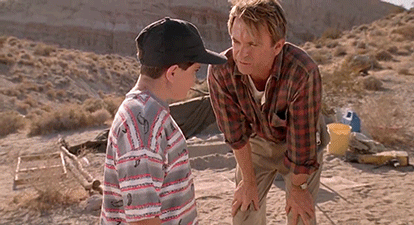
Or take the animated “welcome to Jurassic Park” science primer that’s meant for kids who’ll visit the park — but which actually serves as a primer for the real-life audience while also allowing the characters to react to and/or mock it, thus clarifying their personalities.
As a result, not only are we learning the information we need to understand the plot, but we’re doing it as we learn more about the characters, how their world works, what we should expect, and determining our own hopes for the movie’s outcome.
So, when it comes to JW:FK…
What Would Have Fixed This?
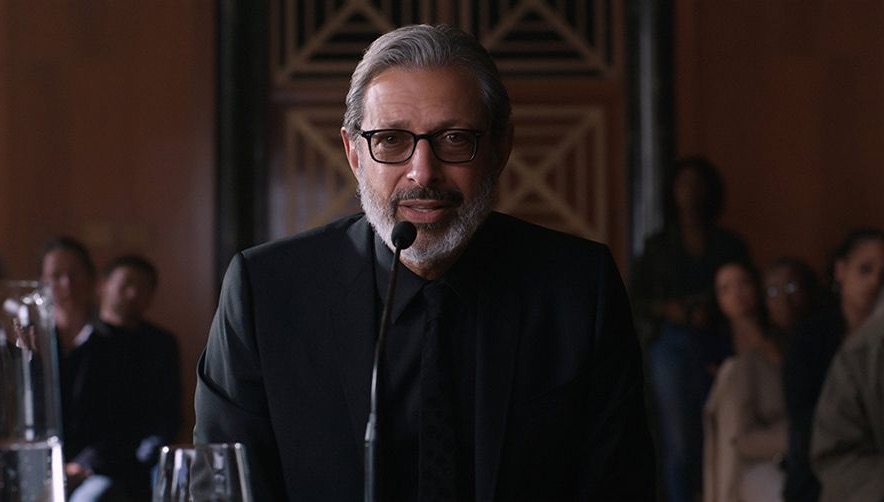
“Hello, I’m here to narrate the film’s theme.”
If you’re going to pay as much visual homage to the first film as Jurassic World: Fallen Kingdom does, you might as well borrow from its story and scene structure too.
For example:
Lockwood’s nurse Iris (Geraldine Chaplin) tells us that Lockwood has a mysterious granddaughter whom he loves… but we only see them together twice, and their interactions are far from endearing.
An easy fix?
In Lockwood’s opening scene, instead of Iris reminding him that it’s time for his medication, have Maisie call out that reminder from the balcony and then shyly run away when he invites her to meet their guests.
This way, you’d still convey all the necessary information, but you’d actually see that they have a legitimate relationship, that Maisie cares about his well-being, and that she is very good at paying attention to details.
Or, rather than opening the film with a MacGuffin chase that ends with the dino-devoured death of a redshirt villain we literally have no reason to care about — and which, by association, frames the dinosaurs as threats who probably should be allowed to go extinct (again)…
Instead, open with a scene of the dinosaurs on the island as the volcano starts to erupt, so we see that threat and wonder from their eyes. This approach would make us empathize with them directly rather than as headline news-ified conceptual abstractions.
And we need to care about these dinosaurs a whole lot, considering…
We Only Have Types, Not Actual Characters
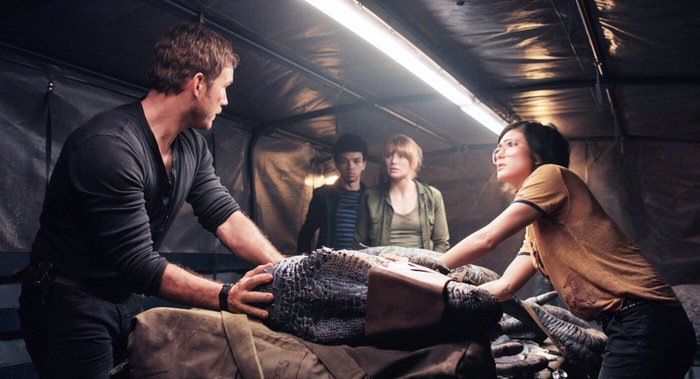
“Hello, I’m here to give you a fetch quest.”
Owen isn’t just a dinosaur behavior expert; he’s also A Brave Dad (Type) Who Never Fails.
Claire isn’t just a reformed corporate drone who’s suddenly a “save them all” activist; she’s also A Brave Mom (Type) Who’s Never Weak.
Zoe isn’t just a dinosaur doctor; she’s also A Bitter Millennial Who’s Never Wrong.
And Franklin isn’t just a techno wizard who’s afraid of everything; he’s also… actually, no, that’s all he is.
Who’s Maisie? She’s the Innocent Child.
Who’s Eli? He’s the Embodiment of Greed.
Who’s Lockwood? He’s the Fallen King.
Who’s special ops leader Ken Wheatley (Ted Levine)? He’s the Petty Villain.
Who’s Mr. Eversol (Toby Jones)? He’s the Elite Villain.
And who’s Ian Malcolm (Jeff Goldblum)? He’s… well, he’s Jeff Goldblum, basically.
This isn’t a cast of characters. This is a recipe of archetypes with a pre-determined outcome.
None of these characters have conflicting personality traits, visible regrets, internal struggles, or even interpersonal nuances. They are all slaves to the plot, which demands that they make continually terrible choices in order to escalate the stakes.
And what’s actually at stake?
Eh, who cares?
Why This Worked in Jurassic Park
Sure, Doctor Grant was a world-renowned paleontologist who preferred fossils to people… and he was also a dick to kids… but he overcame his blind spots and learned to value kids (and humans in general) more than reptiles as a result of surviving dino-geddon up close.
Sure, John Hammond (Richard Attenborough) was a billionaire who dreamed of playing God… but he was also an idealist (in the movie, anyway)… who was forced to admit his own shortsighted failings and sacrifice everything he had built in order to save the people he loved and respected.
Sure, Muldoon (Bob Peck) was a surly game warden who used abusive methods to keep the dinosaurs in check… but he was also genuinely concerned about the safety of park visitors… and he was willing to risk his own life in order to help them escape.
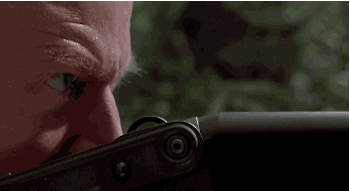
By imbuing each of these characters with at least two opposing personality traits, it creates an opportunity for them to wrestle with their internal flaws and navigate interpersonal relationships in order to achieve their external goals.
But in JW:FK, there is no nuance. Everyone only wants what they want, and they all get exactly what they deserve.
What Would Have Fixed This?
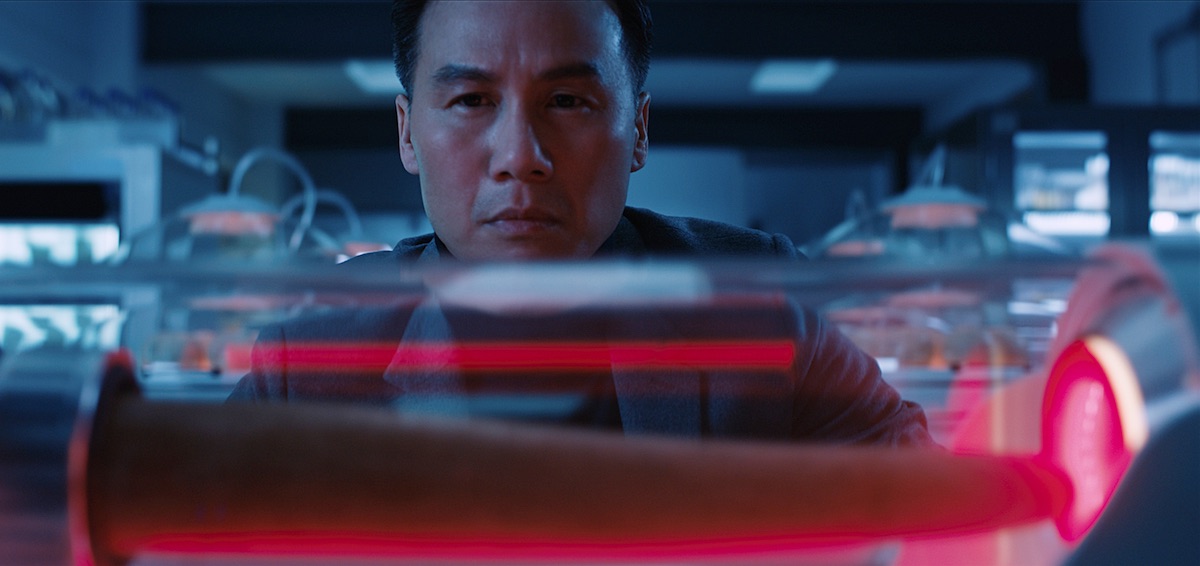
“Hello, MacGuffin.”
Character arcs.
None of the characters in Jurassic World: Fallen Kingdom demonstrably change in any way.
Sure, Franklin has a moment of pseudo-bravery after spending the entire film shrieking like one-note comic relief, but that feels mostly like a balm for the audience.
And sure, Claire does make a choice in the film’s pivotal moment that shows her beliefs have changed. But that choice is immediately overriden because A) the audience wants a different outcome, and B) the plot (and the future of NBCUniversal-owned Comcast’s stock price) depends on it.
The rest of the characters (who survive) remain fundamentally unchanged as characters.
Maisie was a curious daredevil who learns about her family secrets, but that doesn’t really change who she is or how she lives her life.
Zoe exists solely to be snarky — to the extent that one character literally calls her “a nasty woman” — and she remains righteously defiant to the end.
And it’s impossible to expect change from the all-time Mary Sue champion, Owen Grady. Dinosaurs respect him, men envy him, and women — hell, even lesbians — want to date him even though he refuses to ever change or compromise. He’s a Michael Bay hero in a Spielberg universe.
Even Dr. Wu (BD Wong), one of the dino-cloners from the first film, is here essentially as monotone fan service: he’s still splicing that sweet dino DNA… only this time into war machines. If he has any obvious regrets, we don’t get to see them.
It’s frustrating. But consider…
What if, rather than meeting Zoe and Franklin as they work the phones at Claire’s “save the dinosaurs” nonprofit, in a scene that’s is just one big info-dump… we instead met them at a protest rally where they clashed with people face-to-face instead of on the phone? We could still convey all the information in their intro scene PLUS have the benefit of body language, interpersonal dynamics, and maybe even a running joke or shared anecdote that humanizes them despite their differences, which they could bond over later during those high-stress scenes.
Or, instead of Eli Mills telling us that he and Claire met years ago, when he “used to be young and idealistic”… what if we saw that meeting and got a sense of who Eli really was? He’s a forgettable money-hungry villain in Fallen Kingdom, but if we saw who he once wanted to be — or even got a glimpse of his semiparental instincts toward Maisie, which could conflict with his bald opportunism — he’d be a far more satisfying, relatable, and pitiable antagonist.
Or if Owen ever had to… you know… change anything about himself at all in order for the heroes to succeed.
Unfortunately, all of those character-building opportunities are sacrificed for the sake of…
Pointlessly Escalating Action Sequences
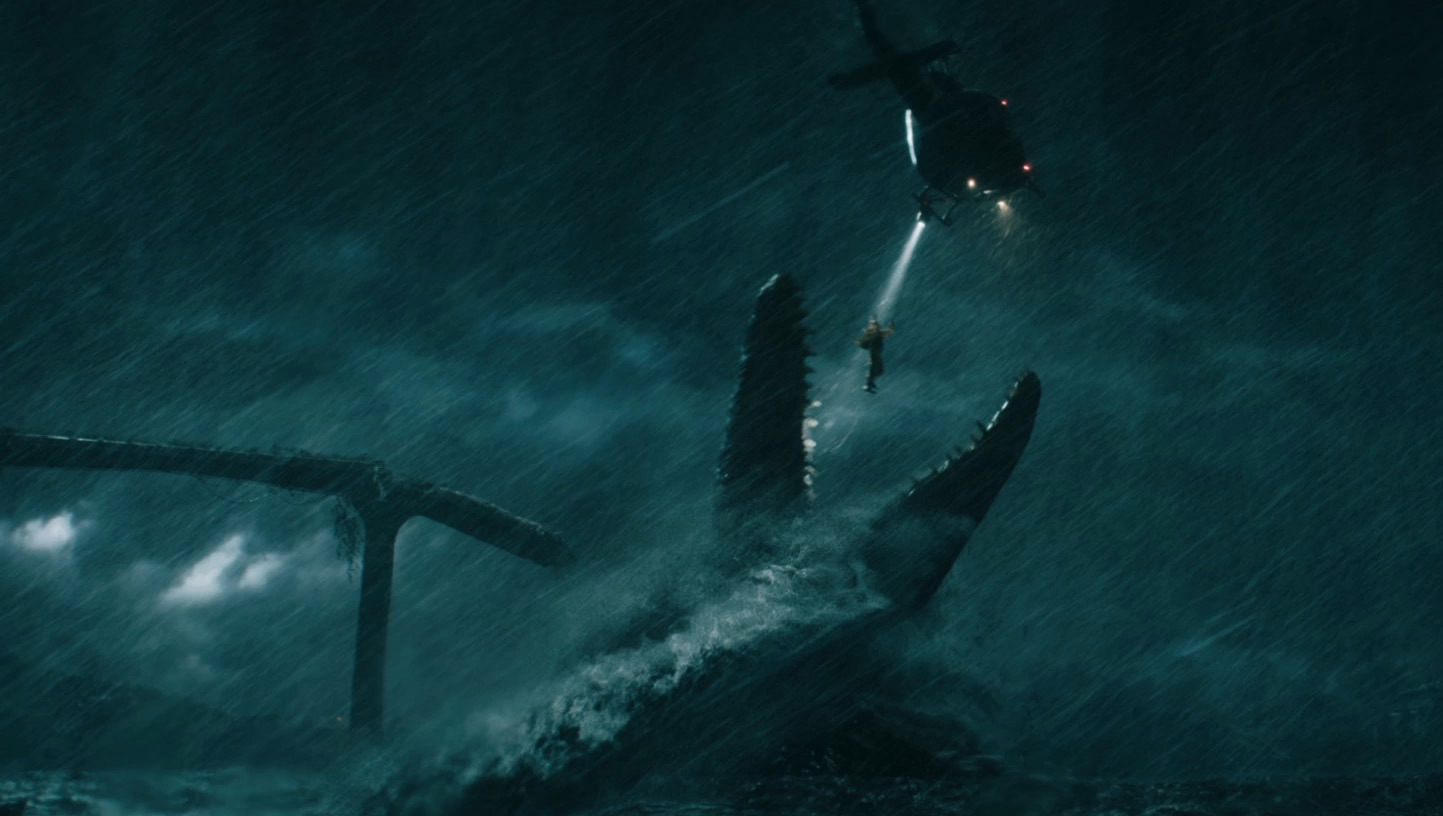
“HELLO, I’M HERE FOR DINNER.”
The first action scene in the movie is “man vs. skyscraper-sized dinosaur.”
When you open with something this big, where do you go from there?
Somewhat amazingly, that’s the one thing Jurassic World: Fallen Kingdom actually does relatively well: it keeps upping the ante in terms of spectacle until it reverses course and shrinks the scale of the conflict back to a literal room-to-room survival showdown between humans and predators.
Classic Jurassic.
The only problem?
Because the heroes are never required to change, we never believe they’ll lose.
Every time it seems like the Indoraptor is about to eat a character whose name you know, you can’t help but expect them to survive completely intact… while every time a villain seems to escape certain death, you’re just waiting for the dino ex machina to deliver cinematic justice.
Why Did This Work in Jurassic Park?
In the original film, there’s only one true villain: Dennis Nedry (Newman… err, Wayne Knight). Spielberg could get away with portraying him cartoonishly because the film needed a clear differentiation between “maybe kinda sorta bad” like Hammond, Muldoon, or the lawyer Gennaro and “actually, definitely bad” like Nedry.
But even then, when Nedry gets his comeuppance at the hands of a lizard that spits blinding poison, that scene works on three levels:
- it feels earned (Nedry underestimates the dinosaur and it literally comes back to bite him)
- it feels thematically terrifying (we realize the unpredictable power of everything humans are up against on this island)
- it makes us question our own moral compass
I mean, sure, Nedry was a callous opportunist who sold out his employer and nearly killed everyone on the island… but did he really deserve to go out like that?
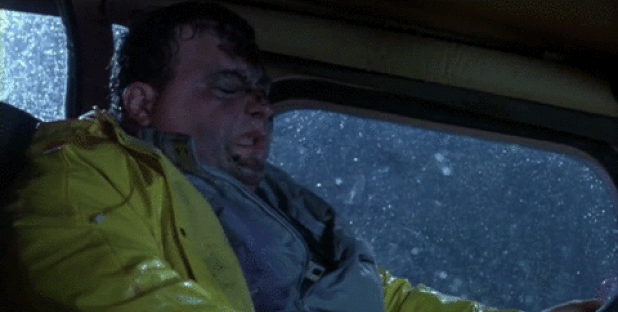
“Hi, I’m here to restore karmic balance!”
As for the other characters, they’re constantly risking their own safety to rescue each other.
Hell, Grant famously hates kids, yet he’s still willing to nearly get himself killed repeatedly in order to save Lex (Ariana Richards) and Tim (Joseph Mazzello) from becoming dino-lunch.
Not only that, but the heroes don’t all survive. Some good people die due to some bad choices and no-win situations.
As soon as we realize that we’re not guaranteed a safe and happy ending in Jurassic Park, the tension in every scene skyrockets.
So…
What Would Have Fixed This?
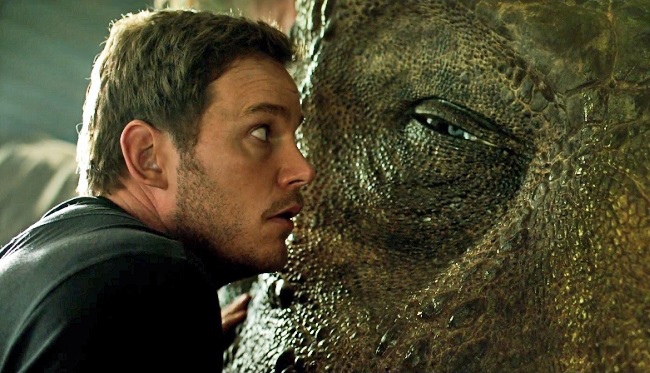
“Hi, I’m Mary Sue.”
Other than the T-Rex having an Owen-sized snack?
The stakes and the payoffs of the action scenes throughout JW:FK would be greatly amplified if they ever required a character to change their behavior or make a no-win choice in order to succeed.
Owen perfectionism jokes aside, consider how different this movie would feel if he had even been seriously injured during their great escape from the island. It would have required every other character to drastically step up their hero game.
Or, less shockingly, what if we actually saw one of the scenes where Franklin is pretending to be a technician in order to keep the mercenaries from killing him? As it is, his entire Act Two survival sequence happens off-camera, all so his eventual return can be played for laughs. But if we saw him need to remain calm under pressure, or be brave in a way that forced him to demonstrably overcome his anxiety, we’d get to share his cathartic relief because we’d see him grow in the process.
Or if Eli stood to lose anything he actually cared about in his pursuit of wealth and power, instead of serving as a ticking clock for the obligatory fan-favorite endgame…
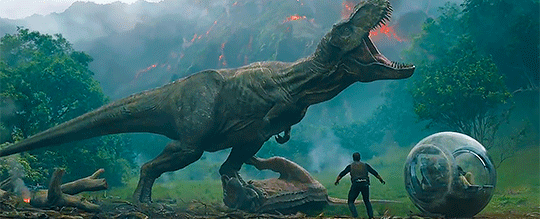
“I’M BAAAAAACK!”
Jurassic World: Fallen Kingdom is, like so many blockbusters, almost a very good movie. Its shortcomings feel magnified because the film comes so close to being truly satisfying.
And while the image of the last brontosaurus at the loading dock is probably going to be seared into my heart for the rest of my life — like I said, this film does a very good job at creating empathy for the dinosaurs — it’s another scene that sums this movie up in my brain.
As Eli and Eversol are auctioning off lethal dinosaurs to the highest bidders in a game of biogenetic warfare, Own and Claire are trapped in a prison cell. By sheer luck, a hammerheaded dinosaur is in the adjoining cell. This leads to a cross-cut sequence in which, as the prices being paid for dinosaur satisfaction keep escalating ever higher, Owen goads the dinosaur into repeatedly ramming its head against the wall until the whole trap breaks wide open.
It’s an ironically self-aware metaphor for the Jurassic World franchise as a whole.
Like This?
Share this post on Facebook or Twitter. (Sharing is caring, yo.)
Subscribe to my newsletter and you’ll never miss a new post. (I email it weekly-ish).
You may also like the story problem in Blade Runner 2049, or the surprising theme in Pixar’s Coco.
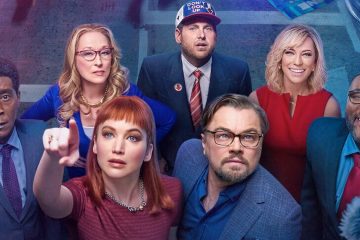
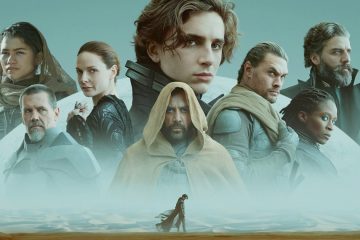
0 Comments